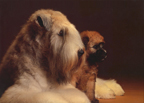Due North: Cottage Safety
BBy Teresa Woodlard, BSc., B.A., D.V.M.
Ebbing rainfall, clearing clouds and rising temperatures. To those of us who frequent northern getaways, it means one thing: cottage season! But we aren’t the only ones who love the great outdoors, and although spending time with your dog at the cottage is a great idea, special care must be taken to maintain your pet’s safety during this fun-filled summer season.
Health matters
First things first: Plan before you leave. If your dog is currently taking any medications, including heartworm and flea preventives, be sure to take enough with you to treat him for the duration of your stay. Bring along his pertinent health information and have the contact numbers of a local veterinarian and emergency clinic handy. Should a medical situation arise, you won’t want to waste valuable time trying to find a vet. Last but not least, pack a first-aid kit for your pet in case of minor injuries.
On the road
For the safety of your family, your pet and others sharing the road, ensure that your pet travels in a carrier or secured with a seat belt. While it’s tempting to allow your dog to have his head out the window, you’ll be putting his eyes at risk for serious injury.
If you stop along the way, remember that leaving your pet(s) inside the car is very dangerous. High temperatures inside your car can cause dehydration, heatstroke and even death. Don’t be fooled by overcast days or believe that leaving the windows rolled down a few inches will alleviate the heat. An outside temperature of 29°C can increase the inside of your car to 50°C in a matter of minutes. If your dog shows signs of distress (rapid or laboured breathing, increased heart rate, excessive salivation, anxious expression in the eyes, pale gums or extreme lethargy), move him to a shaded area, offer fresh cool water and seek veterinary medical attention immediately.
Are we there yet?
Not all dogs are fans of road trips. If your pet dislikes car travel, try shorter trips or frequent breaks to increase his comfort level. Leash your dog to prevent him from getting loose – most rest areas are situated a short distance from major, high-traffic highways. Do not leave your dog tied up in direct sunlight, which will increase body temperature, or on hot concrete or asphalt, which can burn the pads of his feet.
Safety at the cottage
Upon arriving at the cottage, you’ll of course want to relax and enjoy some ‘down time,’ but remember to remain diligent. Warmer temperatures increase the presence of wild animals, so it’s best to monitor and leash your canine friend whenever possible.
Wild encounters
If a skunk sprays your pet, there are many over-the-counter bath products or home remedies available. (Ask your vet or groomer for a recommendation; it’s a good idea to have skunk-odour neutralizer on hand, just in case!) Take special care around the eyes, mouth and ears and contact a veterinarian if signs of eye or skin irritation arise.
If your pet comes in close contact with a porcupine, you should take him to see a vet to remove any quills. Quills hidden under the skin can cause infection or migrate to different areas in the body with potentially dangerous consequences.
Snack safe
Remember that some foods, such as chocolate, garlic, onions, grapes, raisins, coffee and macadamia nuts, are unsafe and/or toxic to dogs. Remove other toxins such as pesticides and slug bait from around the cottage to avoid a health emergency for your pet.
Dogs can contract heartworm from a single infected mosquito, so heartworm prevention is crucial. Ensure proper, on-time administration of preventive medication. Avoid mosquito contact by removing any sources of standing water and keeping your dog inside from dusk until dawn, when mosquitoes are most plentiful. Remember, human topical insect repellents are not suitable for animals.
Beware of bugs
Flea prevention is also important. Signs of fleas include scratching and biting, along with the presence of fleas and flea dirt, which can resemble black pepper. Consult a veterinarian on proper flea prevention and to rule out allergies and other skin conditions prevalent in the summer and fall.
Bee stings and insect bites can produce allergic reactions that cause swelling, pain and breathing difficulties. A local veterinarian can assess the severity of the reaction before treatment.
Water safety
The cardinal rule: Do not leave your pet unattended, either on or off leash, around any bodies of water. Not all dogs can swim, and leashed animals can become entangled, injuring themselves while tethered to a dock or boat.
Ensure your dog wears a life jacket during water travel. Dogs can become agitated, putting everyone’s safety at risk. Monitor your dog’s sun exposure and rinse him with fresh water after swimming in lakes, ponds or streams to prevent skin infections.
By being prepared and practising preventive safety measures, everyone can enjoy a memorable summer at the cottage.
Veterinarian Dr. Teresa Woolard lives in Barrie, Ont. She and veterinarian Dr. Amy Sugar co-authored Dudley’s Summer Adventures, a book on pet summer safety for the entire family, available at pawsitiveresources.com.

